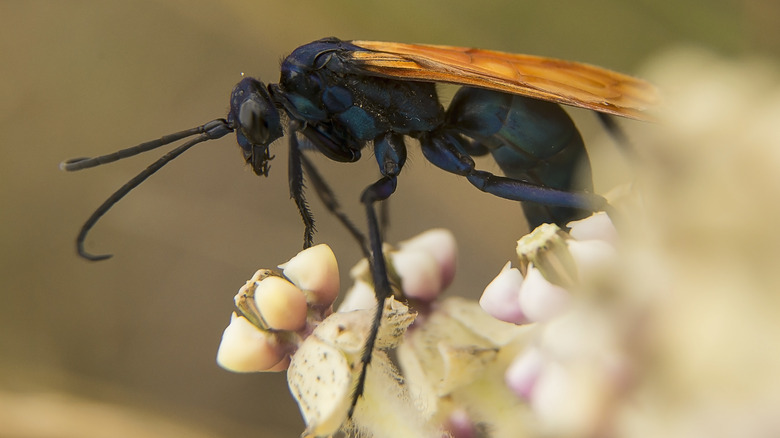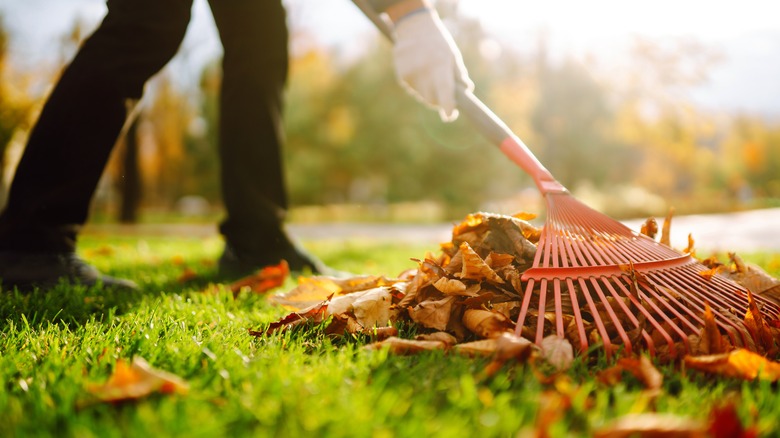Why You Might Want To Keep Tarantula Hawk Wasps Around
When you encounter wasps around your home, it's natural to feel uneasy. But not all wasps should be treated with apprehension. Consider the tarantula hawk wasp – this particular species is quite a marvel in the world of insects. It's not just any ordinary wasp but a fascinating creature with a role that could benefit your home and garden ecosystem. Known for their role as natural pest controllers, these wasps specifically hunt tarantulas, a task they perform with remarkable precision. Surprisingly, they are generally harmless to humans, which makes them even less of a threat.
Their method of hunting is also quite a spectacle. They prey on tarantulas to provide for their future offspring, not for an immediate meal. The wasp stings, paralyzes the tarantula and transports it to a safe spot. There, the wasp lays an egg on the tarantula, ensuring a fresh food source for the larva when it hatches. This might sound a bit grim for the spider, but it's a fascinating example of nature's balance.
These wasps can be a natural solution if you're not a fan of tarantulas roaming your property. According to Healthline, the venom from tarantulas isn't fatal to humans. However, while generally not dangerous, these arachnids can be intimidating and unwelcome in our homes and gardens. Tarantula hawk wasps contribute to a more comfortable living environment by controlling tarantula populations.
Identifying and understanding tarantula hawk wasps
Recognizing tarantula hawk wasps is straightforward, and knowing what to look for can help you identify the unique insects in your environment. These wasps stand out due to their size and coloration. They are typically large, around 2 inches in length. Their most striking feature is the vibrant contrast in their coloring — a shiny black body paired with bright orange wings. This distinct appearance makes them quite noticeable and different from other wasp species you might encounter.
Aside from their physical attributes, understanding their behavior can also assist in identification. Tarantula hawk wasps are known for their distinctive flight patterns — they tend to fly close to the ground, a habit that is part of their hunting strategy as they search for tarantulas. Observing their flight can provide a clue to their presence even before you get a close look at them. These wasps also exhibit unique behaviors that are tied to their lifecycle. For instance, female wasps are the ones who hunt and paralyze tarantulas. Additionally, these wasps are solitary, so you're unlikely to find them in large groups or forming nests like other wasp species.
Lastly, the habitat of the tarantula hawk wasp is another aspect to consider. They are adaptable and can be found in various environments, from deserts to urban areas. However, their presence is especially notable in regions where tarantulas are prevalent. If you live in an area known for tarantulas, the likelihood of encountering tarantula hawk wasps is higher.
Managing tarantula hawk wasps
If you'd rather not live with tarantula hawk wasps, it's important to approach their management with care, considering that they can bite. Protective clothing is key to avoid getting bitten — think long sleeves, gloves, and pants. Tarantula hawk wasps, particularly the females, can be protective of their nests and have one of the most powerful stings in the insect world. However, they're only aggressive towards humans when they feel threatened. Getting rid of these wasps doesn't always mean killing them; often, it just involves making your space less inviting. Since they are drawn to areas with abundant tarantula populations, reducing these spiders around your home can naturally decrease the wasps' presence. Regularly clearing debris, sealing cracks, and maintaining a clean yard can help minimize tarantulas and, consequently, wasps.
Attracting natural predators of the wasp is another ecological approach to managing their numbers. Birds like roadrunners are one example. However, be aware that roadrunners can be aggressive, so consider this when inviting them into your garden. Another natural predator is the bullfrog. If you live near a water habitat, encouraging bullfrogs can be beneficial. Creating a pond in your yard can attract bullfrogs, providing a natural control method for the wasps. Using insecticides is another option. Select products specifically designed for wasps and follow the instructions carefully. Apply the product to areas where wasps are likely to nest or hunt, such as ground burrows or under eaves. Once again, be sure to dress for the occasion.


